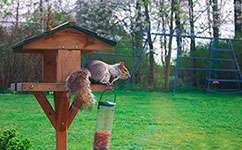Grey squirrels stop garden birds using feeders

The presence of grey squirrels at standard, hanging bird feeders cuts the number of birds visiting them by a huge 98 per cent, the latest study reveals.
So, if you're one of the third of households that provides food for birds during the winter, scientists suggest opting for squirrel-proof feeders, rather than standard models.
'We've clearly demonstrated that grey squirrels will affect garden birds' use of a feeder,' says Dr Karl Evans of the University of Sheffield, who oversaw the study, published in Ibis.
'Whether or not these findings have a long-term impact on common garden birds will depend on how quickly they can find an alternative food source. The effect will be most keenly felt by birds in areas that support lots of grey squirrels and that don't have many feeders,' he adds.
Evans and colleagues from the University of Sheffield presented garden birds in the city with three different bird feeders during November and December 2011.
One was a normal feeder filled with sunflower seeds. Another was the same, but included a piece of grey card the same size as a squirrel stuck to it - the control. Finally, the test feeder included a normal bird feeder with a stuffed grey squirrel attached to it - the squirrel feeder.
'For the control feeder, we wanted to put something else on the feeder to show that birds were not simply reacting to an object on the feeder that blocked some of the feeding ports,' explains Evans.
Evans and colleagues found that in almost all cases, the most common garden birds, including blue tits, great tits and chaffinches, stopped using the squirrel feeder, but carried on using the others. The only bird not deterred from using the squirrel feeder was the feisty little European Robin.
When the scientists weighed the amount of food left in each of the feeders, they found a 97 per cent drop in the amount of seeds taken from the squirrel feeder compared with the normal feeder, suggesting birds rarely fed at the squirrel feeder.
In a separate experiment, the researchers spent a total of two and half hours watching garden birds' use of a feeder when real grey squirrels were present on the feeder. Again, they found the same results.
The study is the first to show that grey squirrels discourage birds from using feeders.
Previous research has also shown that normal bird feeders tend to attract squirrels, making the situation worse.
'We've also found that areas across Sheffield that have bird feeders are more likely to have grey squirrels,' says Evans.
'Effects are perhaps likely to be greatest during the winter, when birds are energy-limited and must feed regularly during the shorter daylight period to sustain survival,' write the authors in their report.
The non-native grey squirrel is common in the UK, especially in urban places. Having also been introduced to northern Italy in 1948 and 1966, they're now common there, and scientists predict they'll spread to France by 2026 to 2031 and to Switzerland by 2031 to 2041.
More information: Colin Bonnington, Kevin J. Gaston, Karl L. Evans, Assessing the potential for Grey Squirrels Sciurus carolinensis to compete with birds at supplementary feeding stations, Ibis Volume 156, Issue 1, pages 220-226, January 2014, Article first published online: 27 NOV 2013, DOI: 10.1111/ibi.12107
Provided by PlanetEarth Online
This story is republished courtesy of Planet Earth online, a free, companion website to the award-winning magazine Planet Earth published and funded by the Natural Environment Research Council (NERC).



















